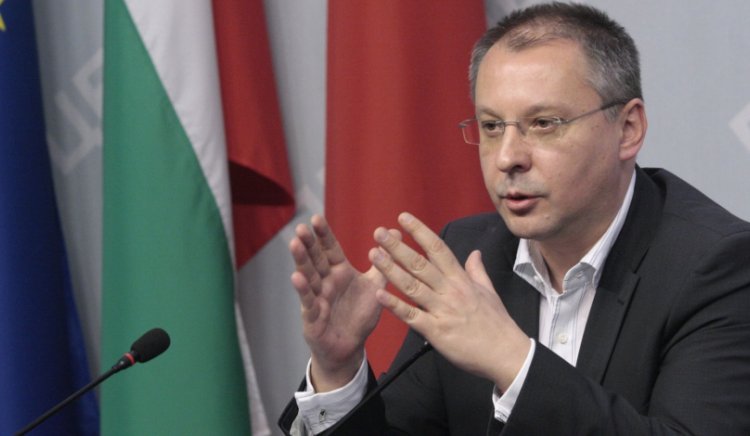Европа близо до гражданите
Не приемаме Европа- разделена на кръгове и на първа и втора класа членство
Не приемаме Европа- разделена на кръгове и на първа и втора класа членство. Това заявява президентът на ПЕС и лидер на БСП Сергей Станишев във втората на част на интервюто си за „New Europe". Според него Европа може да бъде по- силна и по- близо до гражданите, само на основата на единството, демокрацията и солидарността. Президентът на ПЕС остро критикува политиката на десните, която има негативни последици за икономиката и вкара Еврозоната в рецесия. Станишев беше категоричен, че е важно да има отговорност към финансите, но проблемите не се решават само с рестрикции. Лидерът на европейските социалисти обръща специално внимание на проблема с младежката безработица, като изтъкна, че създаването на работни места за младите европейци трябва да бъде първи приоритет за ЕС. Станишев отбелязва и ползите от въвеждането на данък върху финансовите транзакции и издаването на евробонове. Според президента на ПЕС Европейската централна банка може да се използва по- ефективно, за да се осигури икономически растеж. По отношение на АКТА, Станишев изтъква, че единствено европейските социалисти са излезли с ясна и категорична позиция срещу търговското споразумение. Президентът на ПЕС отбелязва, че предстои да се срещне с еврокомисаря по междуинституционалните отношения и администрация Марош Шефчович. Двамата ще осъдят бъдещето на европейските политически партии в контекста на приетия от Европейския парламент Доклад от 2011г. Според Станишев е необходима повече яснота за статута на европейските политически партии с оглед да предстоящите през 2014г. евроизбори.
Следва пълния текст на втората част на интервюто на Сергей Станишев:
In the second of a two-part exclusive interview with New Europe, the former Bulgarian prime minister and interim president of the Party of European Socialists (PES), Sergei Stanishev, reflects on some of the major challenges for the continent and the political options facing the centre-left in Bulgaria today.
Stanishev said that Europe could be stronger and closer to citizen than it is now, but only if it were united, democratic and based on solidarity. "We do not accept Europe which is divided into circles, first and second class membership", he said.
The PES president explained that it is often conservative parties that are perceived as favouring financial responsibility, while the socialists are seen as spending and increasing the public debt. "Financial responsibility of every government is important, and it is a priority," he said, adding that during his time as Bulgarian prime minister, the government had surpluses in the budget, increased the fiscal reserves and decreased the public debt from 25% of GDP to 14%.
"Position of the European social democracy is that there has to be a financial responsibility but you cannot break through this cycle of crisis only with fiscal restrictions, which are bringing negative results," Stanishev said. He criticised the conservatives for focusing on austerity with negative economic results and the Eurozone entering recession.
Stanishev underlined that there are five and a half million young people unemployed in Europe and warned that "people are becoming more and more negative and sceptical about Europe and the commitment of the EU to their destiny and their own life". He pointed out that job creation should be a high priority for the EU, and that a financial transactions tax (FTT) could provide substantial funds "to invest into smart and competitive growth". He also highlighted a change of attitude with the European Commission regarding the FTT, and stressed that for socialists the timing of taking decisions at the European level and securing an FTT without loopholes were of paramount importance.
The PES president said that Eurobonds could also be an important tool in overcoming the economic crisis and emphasised the need for a more effective use of the European Investment Bank (EIB) as a tool for economic growth in Europe, as well as the extended role of the European Central Bank (ECB). He pointed out that one of the major economic, social and political problems of Europe remains youth unemployment, costing our economies €100 billion per year. "If young people do not see better life in EU, they will turn anti-European", he added.
Asked to explain the visible decline of social democrats in Europe, Stanishev said that "the conservatives are actually ruling Europe" and that PES and its member parties have to present an "alternative which should be economically credible". He added that "there are good prospects for the elections both in France and in Romania" and added that socialists in those countries can only succeed if provide "clear political line and political and economic alternatives", because in the past it was hard to "differentiate between the conservatives and social democrats".
Stanishev admitted that, though PES claimed spearheading fight against the Anti-Counterfeiting Trade Agreement (ACTA), there wasn't much coordination with member parties and heads of the state and government from the political family on the subject. He stressed that European socialists are "the only European political party" which has publicly denounced ACTA, and added that in countries where member parties are in power, and which are potentially considering ratification of ACTA, though PES cannot intervene in internal affairs, "we shall try to persuade them about our points and arguments".
Stanishev also said that he will discuss during his upcoming meeting with Inter-institutional Relations Commissioner Maroš Šefčovič the future of European political parties in the framework of the Giannakou report adopted in 2011 by the European Parliament. He pointed out that two months ago leaders of the four major European political factions - the European People's Party, Socialists, the Liberals and the Greens - had a meeting with European Commission President José Manuel Barrosso and Commissioner Šefčovič to discuss the funding and legal status of the European political parties.
"We need clarification of the status of European political parties and this should happen before the next European elections in 2014 and I very much hope that Commissioner Šefčovič and the Commission will move faster in this direction," Stanishev said.




